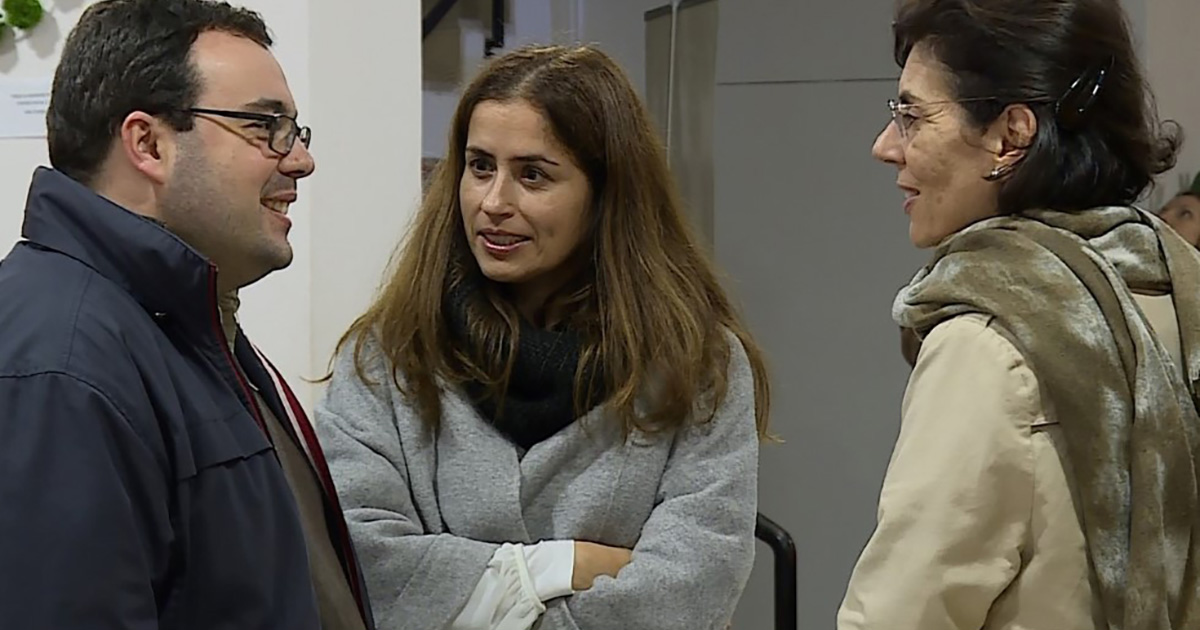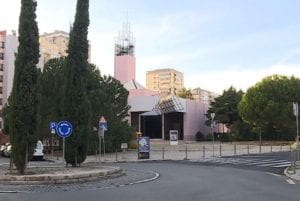“It’s a great wealth,” says catechist Magdalena Dionisio, from the community of Santo Tomás de Aquino in Lisbon.
Lisbon, Nov 14, 2018 (Ecclesia) – Fr. Nelio Pita, director of the Major Seminary of the Congregation of the Mission of the Portuguese province, says that providing contact with the concrete reality of society for future priests should be a priority for the Catholic Church.
In an interview with the ECCLESIA Agency, during the Week of the Seminary, the director of the formation of the Vincentian Missionaries emphasized the fact that pastoral involvement of the seminarians “has advantages for all concerned.”

Photo: Seminarian António José Clemente collaborates with several pastoral sectors of the parish of St. Thomas Aquinas, Agencia ECCLESIA
It has advantages for “the seminarians,” who do not appear as “distant subjects, as if they were angels from another world, far removed from the society which they will later serve.” At the same time it is also important “for the Christian community, to become more involved and more committed to the process of growth and maturation of the vocation of these young men,” explained Father Nélio Pita.
The Major Seminary of the Congregation of the Mission of the Portuguese Province, located in the center of Lisbon, in the Parish of St. Thomas Aquinas, is an example of how the most theoretical formation of the seminarians can be combined with an experience within the community, thus involving the laity in the formation process.
According to the director of the seminary, formation unfolds in this manner because from the beginning of the Congregation of the Mission — a Society of Apostolic Life founded by St. Vincent de Paul in 1625 — this “community outreach dimension” was always present as a “constitutive element” of its institutional life.
“We are born for the mission, but we live in community,” emphasized Fr. Nélio Pita, who highlighted the formative project that is taking place in a “family atmosphere,” with a team of “few priests.” This process demands the establishment of a pastoral relationship with the surrounding community, in this case, the parish of St. Thomas Aquinas.”
The larger community plays a significant role in the preparation of future Vincentian priests, so much so that at the end of each stage, lay people, who have worked most closely with the seminarians, are asked to evaluate these young men who are candidates for the priesthood. Father Nelio stated: “Sometimes, I ask their opinion about a candidate, inquiring if said individual should or should not continue forward.
The director also pointed out that the seminarians ministry with the laity provides them with an opportunity for a more intense vocational discernment, an opportunity they would not have if they lived apart from such an active parish environment. For example, issues that surround the family environment, the conjugal environment and the profession/work environment, cannot be viewed as “taboo,” as so something that cannot or should not be spoken about and addressed.
The Major Seminary in Lisbon currently has a candidate for the priesthood, António José Clemente, or ‘Tozé’, as he is affectionately called. He is thirty-two years old and a native of Alferrarede in Abrantes. In addition to his theological studies, ‘Tozé’ collaborates with the parish catechetical program, with the Society of Saint Vincent de Paul [a branch of the Vincentian family that aims to provide assistance to the poorest of the poor], and with the liturgical life of the parish [for example as a member of the choir and coordinating a group of acolytes].
Maria Helena Oliveira works with the Vincentian seminarians who are involved in the parish’s catechetical program. She stated: “This is real life, and contact with families, with people of ever age, is what prepares these young men to become future pastors of a community.”
Madalena Dionisio, who also collaborates with “Tozé,” stated that the seminarians benefit from being in contact with young people and at the same time they are able to give witness to the gospel as they interact with people of every age and people from every walk of life.
Another fundamental aspect of the formation process is accompanying the seminarians in the development of the affective dimension of their life. Once again, laymen and women as well as professionals become involved with the seminarians as they continue to develop this aspect of their life.
For Nelio Pita observed: “The priesthood is a vocation that demands the development of the whole person. Individuals do not serve the Lord solely with their intellect. In fact St. Vincent often stated that the missionaries had to serve in an affective and effective manner. Therefore, every dimension of the human person but be developed in order to serve the poor in the best possible manner.” Nélio Pita.
Father also spoke about the importance of ongoing accompaniment that must continue even after ordination: “that is a fundamental aspect of the formation process and some departures of priests are due in large part to this lack of follow-up after ordination. It is an area that needs closer attention.”
The Catholic Church in Portugal has recently concluded the celebration of the Week of the Seminary, the theme of which was “Forming missionary disciples.”
JCP
Source: Agência ECCLESIA








Wonderful support/formation in a parish program…needs to be copied!